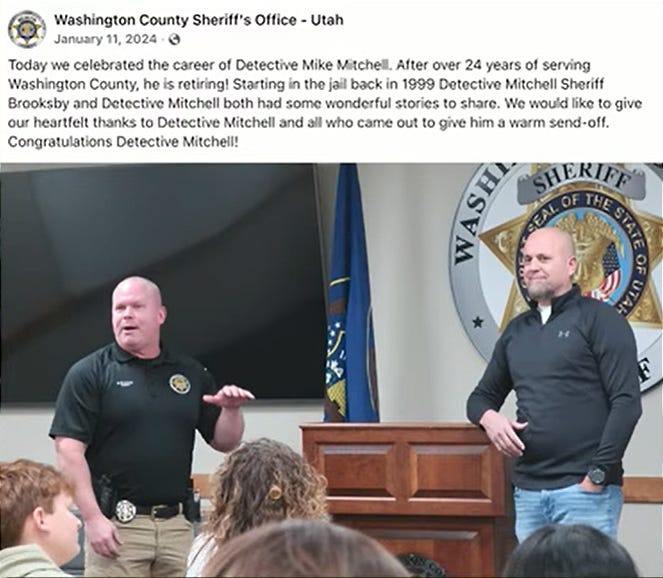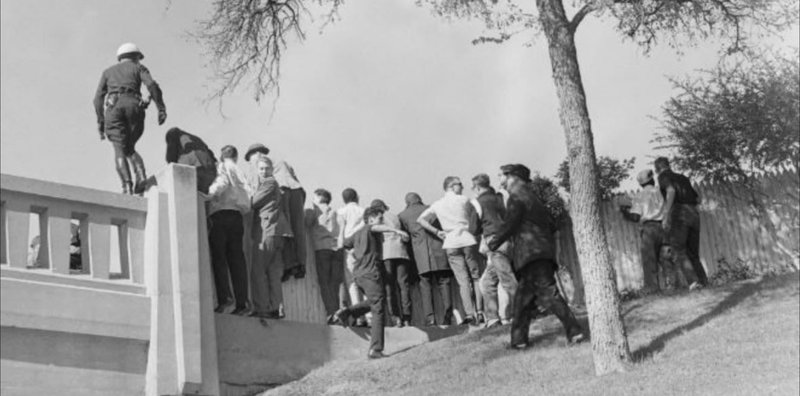The Charlie Kirk assassination and the impulse to declare things as forgeries
Posted: Tue Oct 07, 2025 8:35 pm
Introduction, on forgeries
When it comes to controversial topics, there is a common kneejerk reaction of declaring any piece of contrary evidence to be a fake or forgery. This is something we see frequently with the Holocaust, on both sides, but also with other major historical and political topics.
To begin with, it's not an entirely unfounded reaction. We all know of real, consequential forgeries, like FDR's map of a Nazi plan to partition South America, or the Kuwaiti ambassador's babies-taken-from-incubators story, or the Gulf of Tonkin attack. Examples like these have had an enormous cost in human life.
But there are also endless examples of false accusations of fakery, like the Israeli government's claims that videos in Gaza are staged with dolls or actors, or the competing accusations of forgery over the course of the war between Russia and Ukraine, or the Zimmerman telegram from WWI which was widely thought to be a forgery. In possibly the worst case, Alex Jones raised theories of the Sandy Hook Elementary school shooting being somehow fake, then retracted those theories later, only to be hit much later with unprecedented legal judgements against him in excess of $1 billion. Examples like these should surely make one consider the costs of making a reckless accusation.
Now obviously this type of accusation is a powerful narrative tool. If you can convince your audience that your opponent has forged evidence against you, it simultaneously clears yourself of blame and harms your opponent's reputation. Highly effective. But if you fail, the reputational harm lands on you and your cause.
In the case of the Holocaust, I do think there is an overeagerness to say that remarks attributed to the Nazis are forgeries. In many cases this seems to be not only untrue but totally unnecessary. Many of the Extermination Theory's most important prooftexts are evidence to the contrary when read in their full and proper context. Here I will direct the reader to this post by Callafangers in a thread by Archie on this same subject:
Charlie Kirk was killed almost a month ago. From the first day, various political forces have tried to pin the assassination on their ideological enemies. These primarily fall into right versus left, groyper versus communist, and Zionist versus anti-Zionist. Even Benjamin Netanyahu couldn't resist the urge to connect the killing with Islam. Members of these groups have since accused seemingly every single piece of evidence connected with the case of being faked, a behavior that would surely be discrediting if any side had the good sense not to participate in it. Here I will briefly go over some of those accusations.
1) Messages written on the bullet casings. These were found on the rooftop where the shooting occurred. The messages clearly indicate leftist leanings. Some replies have claimed they were a false trail left by a MAGA shooter, or they are fake because the messages were too long (up to 9 words) to fit on the casings, or that they would not be "engraved" as Governor Cox said, or that the FBI and police are just generally untrustworthy.
2) Photos of the shooter. Some replies have said these captures seem fake for no particular reason. Ron Unz found it suspicious that only two photos were given.
3) Video of shooter on the rooftop. This fuzzy video depicts the assassin fleeing the scene. Repliers were skeptical for various reasons, chiefly because they couldn't make out the gun he was carrying. Later, after it was determined that this video camera should have captured the shooting itself, skeptics theorized that the reason those earlier events were not included in the cut is because they did not actually happen on video.
4) Tyler Robinson's text message confession. This has been called "too convenient", "too perfect", and too "inorganic" for a text chat between young men.
5) Tyler Robinson's Discord message confession. This was called fake because Discord initially denied it, according to TMZ's reporting, but all other sources have since confirmed it as real.
6) DNA evidence found on a towel and screwdriver. These positively link Robinson to the rifle and the rooftop. Skeptics said this didn't make sense because they thought the rifle should be disassembled after the shooting and also because Robinson would need to have kept the screwdriver to reassemble it.
7) Charlie Kirk's letter to Netanyahu. This was called a lie, a lie by omission, and a misrepresentation, although it's not clear why. The subsequent publishing of the full letter, presumably leaked by Netanyahu, seems to have verified his claims, but that too has been called a fake.
8) Charlie Kirk's Zionist groupchat. This screenshot was initially called fake only because it easily could be faked. However, Kirk's executive producer has since confirmed the screenshot's veracity.
My judgement is that all of the above accusations were very poorly made. Several have been outright disproven already. In every case it is and was easily predictable that these items would turn out to be legitimate because they came from (relatively) credible sources with reputations to lose. Whereas if the items were illegitimate then we would expect a vocal denial from other involved parties, including the telephone company, Discord's staff, friends and family, the media, etc. It is inevitable that many of these items (and others less remarked upon, like the handwritten confession) will become even further beyond reproach when the case goes to trial.
So it was totally reckless and discrediting to declare things as forgeries based on mere skepticism. There is an obvious lesson here for skeptics generally and for revisionists specifically.
Apologies if this was too long winded. I am also willing to argue that Israel did not commit the assassination if anyone feels inclined.
When it comes to controversial topics, there is a common kneejerk reaction of declaring any piece of contrary evidence to be a fake or forgery. This is something we see frequently with the Holocaust, on both sides, but also with other major historical and political topics.
To begin with, it's not an entirely unfounded reaction. We all know of real, consequential forgeries, like FDR's map of a Nazi plan to partition South America, or the Kuwaiti ambassador's babies-taken-from-incubators story, or the Gulf of Tonkin attack. Examples like these have had an enormous cost in human life.
But there are also endless examples of false accusations of fakery, like the Israeli government's claims that videos in Gaza are staged with dolls or actors, or the competing accusations of forgery over the course of the war between Russia and Ukraine, or the Zimmerman telegram from WWI which was widely thought to be a forgery. In possibly the worst case, Alex Jones raised theories of the Sandy Hook Elementary school shooting being somehow fake, then retracted those theories later, only to be hit much later with unprecedented legal judgements against him in excess of $1 billion. Examples like these should surely make one consider the costs of making a reckless accusation.
Now obviously this type of accusation is a powerful narrative tool. If you can convince your audience that your opponent has forged evidence against you, it simultaneously clears yourself of blame and harms your opponent's reputation. Highly effective. But if you fail, the reputational harm lands on you and your cause.
In the case of the Holocaust, I do think there is an overeagerness to say that remarks attributed to the Nazis are forgeries. In many cases this seems to be not only untrue but totally unnecessary. Many of the Extermination Theory's most important prooftexts are evidence to the contrary when read in their full and proper context. Here I will direct the reader to this post by Callafangers in a thread by Archie on this same subject:
The Charlie Kirk assassinationCallafangers wrote: ↑Sat May 10, 2025 9:30 pm While it's entirely plausible that certain documents or other materials have been faked (given we know various powers have had motive, means, and patterns of deception, historically), I do see quite often that people (including Revisionists) do not take long enough to carefully consider everything in proper context. I think the Himmler Posen speech is a prime example of this.
Charlie Kirk was killed almost a month ago. From the first day, various political forces have tried to pin the assassination on their ideological enemies. These primarily fall into right versus left, groyper versus communist, and Zionist versus anti-Zionist. Even Benjamin Netanyahu couldn't resist the urge to connect the killing with Islam. Members of these groups have since accused seemingly every single piece of evidence connected with the case of being faked, a behavior that would surely be discrediting if any side had the good sense not to participate in it. Here I will briefly go over some of those accusations.
1) Messages written on the bullet casings. These were found on the rooftop where the shooting occurred. The messages clearly indicate leftist leanings. Some replies have claimed they were a false trail left by a MAGA shooter, or they are fake because the messages were too long (up to 9 words) to fit on the casings, or that they would not be "engraved" as Governor Cox said, or that the FBI and police are just generally untrustworthy.
2) Photos of the shooter. Some replies have said these captures seem fake for no particular reason. Ron Unz found it suspicious that only two photos were given.
3) Video of shooter on the rooftop. This fuzzy video depicts the assassin fleeing the scene. Repliers were skeptical for various reasons, chiefly because they couldn't make out the gun he was carrying. Later, after it was determined that this video camera should have captured the shooting itself, skeptics theorized that the reason those earlier events were not included in the cut is because they did not actually happen on video.
4) Tyler Robinson's text message confession. This has been called "too convenient", "too perfect", and too "inorganic" for a text chat between young men.
5) Tyler Robinson's Discord message confession. This was called fake because Discord initially denied it, according to TMZ's reporting, but all other sources have since confirmed it as real.
6) DNA evidence found on a towel and screwdriver. These positively link Robinson to the rifle and the rooftop. Skeptics said this didn't make sense because they thought the rifle should be disassembled after the shooting and also because Robinson would need to have kept the screwdriver to reassemble it.
7) Charlie Kirk's letter to Netanyahu. This was called a lie, a lie by omission, and a misrepresentation, although it's not clear why. The subsequent publishing of the full letter, presumably leaked by Netanyahu, seems to have verified his claims, but that too has been called a fake.
8) Charlie Kirk's Zionist groupchat. This screenshot was initially called fake only because it easily could be faked. However, Kirk's executive producer has since confirmed the screenshot's veracity.
My judgement is that all of the above accusations were very poorly made. Several have been outright disproven already. In every case it is and was easily predictable that these items would turn out to be legitimate because they came from (relatively) credible sources with reputations to lose. Whereas if the items were illegitimate then we would expect a vocal denial from other involved parties, including the telephone company, Discord's staff, friends and family, the media, etc. It is inevitable that many of these items (and others less remarked upon, like the handwritten confession) will become even further beyond reproach when the case goes to trial.
So it was totally reckless and discrediting to declare things as forgeries based on mere skepticism. There is an obvious lesson here for skeptics generally and for revisionists specifically.
Apologies if this was too long winded. I am also willing to argue that Israel did not commit the assassination if anyone feels inclined.





